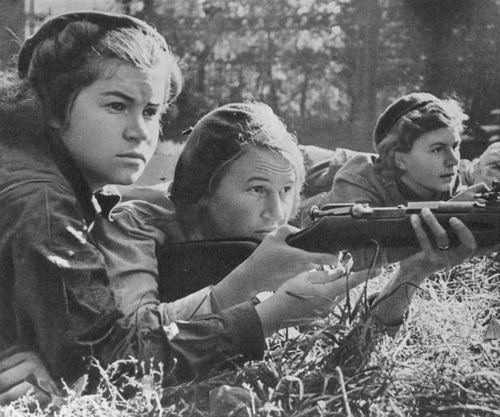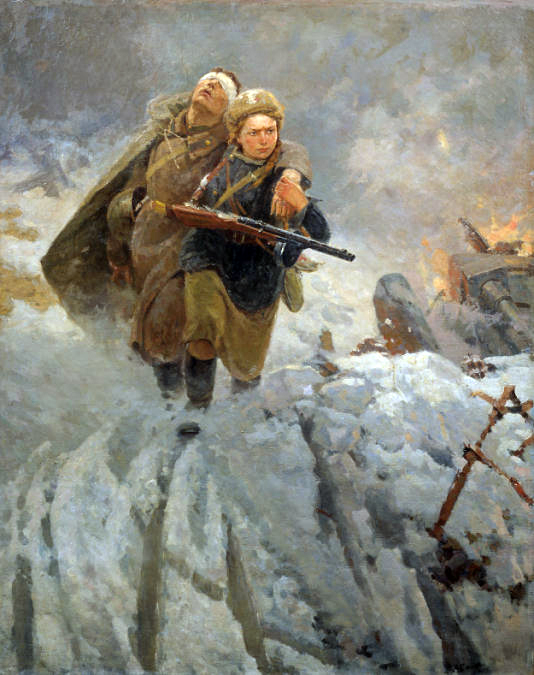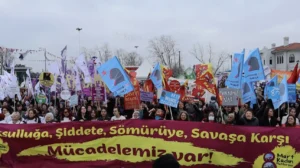
Brazil: The inextinguishable flame of the Battle of Stalingrad
Hereby we publish an unofficial translation of an article published by the People’s Women’s Movement.
The 2nd of February marks the anniversary of the victory of the Red Army in the battle of Stalingrad (02/02/1943). Hitler’s fascist hordes tried to conquer the USSR in three months with their Blitz Krieg, something they had already done in several European countries. They wanted to destroy and conquer the Socialist Homeland. But the highest and most illustrious German leaders did not count on the imposing, courageous and heroic people under the firm leadership of Comrade Stalin. These are heroic pages of the international proletariat that can never be forgotten, they are indelible demonstrations of courage and heroism in the face of the Nazi beast.
Already in 1941, the glorious Red Army, under the direction and command of Comrade Stalin, had already opposed with fearless resistance the fierce Nazi-German attack, at the gates of the city of Moscow. They targeted Stalingrad because it was the industrial center of the USSR, which at that time had the strategic role of producing artillery goods for the resistance troops. The city was located around the Volga River, which was an important route connecting the western part of the country with its distant eastern regions. Furthermore, Hitler counted on the propaganda effect that meant taking the city named after the great Stalin. With the command of “No step back” from the great leader of the international proletariat and the Bolshevik Party, Stalingrad decisively did not retreat or evacuate its 400 thousand inhabitants and the masses joined the War of Liberation of the socialist Fatherland. In the winter of 1942-43 alone, the Germans lost more than 7 thousand tanks, 4 thousand planes, 17 thousand guns. Since the start of the German invasion, the Red Army had put nine million Nazi-fascist officers and men out of action, of whose no less than 4 million died on the battlefield.
This is how Chairman Mao Tse-Tung explains the meaning of this battle:
“During those forty-eight days, the news of each setback or triumph from that city gripped the hearts of countless millions of people, now bringing them anxiety, now stirring them to elation. This battle is not only the turning point of the Soviet-German war, or even of the present antifascist world war, it is the turning point in the history of all mankind. Throughout these forty-eight days, the people of the world watched Stalingrad with even greater concern than they watched Moscow last October. […] following the battle for the defense of Stalingrad, the situation will be totally different from that of last year. On the one hand, the Soviet Union will launch a second winter counteroffensive on a vast scale, Britain and the United States will no longer be able to delay the opening of the second front (though the exact date cannot yet be foretold), and the people of Europe will be ready to rise up in response. On the other hand, Germany and her European accomplices no longer have the strength to mount large-scale offensives, and Hitler will have no alternative but to change his whole line of policy to the strategic defensive.”
Stalingrad offered its share of blood, more than 20 thousand lives in a war street by street, house by house, attic by attic, floor by floor, room by room, chapters of heroism that shook the world, beginning the counteroffensive to defeat Nazi-fascism during the Second World War!
In these heroic pages, women bravely stood out. They unleashed their revolutionary fury by taking up their positions in the struggle for their emancipation as part of the emancipation of the class. They could not surrender, renounce all the achievements that the construction of socialism had already given them, it was necessary to defeat the Nazis and advance further.

Hereby we publish an unofficial translation of some excerpts published in the article, which come from the memories of Marshal Vasili. I Chuikov, commander of the 62nd Army of Stalingrad:
(…) Although in the past many women served in the armed forces and on the front lines on their own initiative, Soviet women went to the front called upon by the Party and the Komsomol [Communist Youth of the Soviet Union], deeply aware of their defense duties and of the interests of their socialist country. They had been prepared for this by our Communist Party, because at the time our State was the only one in the world in which women enjoyed, according to the Constitution, the same rights as men. (…)
There is no exaggeration in saying that women fought alongside men everywhere during the war.
It must also be remembered that in the second half of 1942, when our armies had withdrawn to a line running through Leningrad, Mozhaysk, Voronezh, Stalingrad and Mozdok, leaving densely populated areas in enemy hands, and then new recruits were needed. Women, massively joined the Army and this made it possible for us to restore our units and bases until their full efficiency. (…)
The communications’ units of the 62nd Army were mainly made up of women, which carried out their instructions with dedication. If we sent them to a communications position, we could be sure that communications would be secure. Artillery and mortars could shot against the position, planes could drop bombs on it, enemy troops could surround it – but, unless we ordered to do it, women did not abandon their position even in the face of death.
I know the case of a girl who stayed at a communications position near Basargino station – a young woman whose name was Nadia Klimenko. Her comrades had been killed or injured, but she remained at her position and continued to report what was happening on the battlefield. This was her last report to the Army communications center: “There is no one left at the position. I’m alone. Shells explode all around…To the right I can see tanks, with crosses painted on them, moving, with infantry behind…It’s too late for me to leave. I don’t care if they shoot! I will continue to inform you in the same way. Listen! A tank approaches to my position. Two men jump out of it…They are looking around – I think they are officers. They’re coming towards me. My heart stopped beating for fear of what might happen…” This was the end. Nobody knows what happened to Nadia Klimenko. (…)

